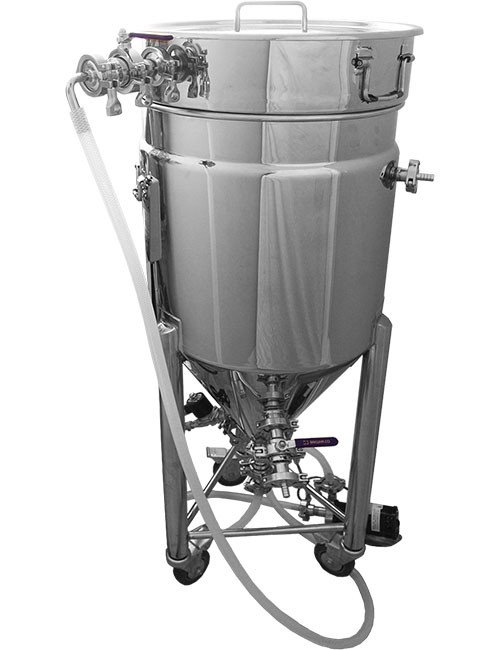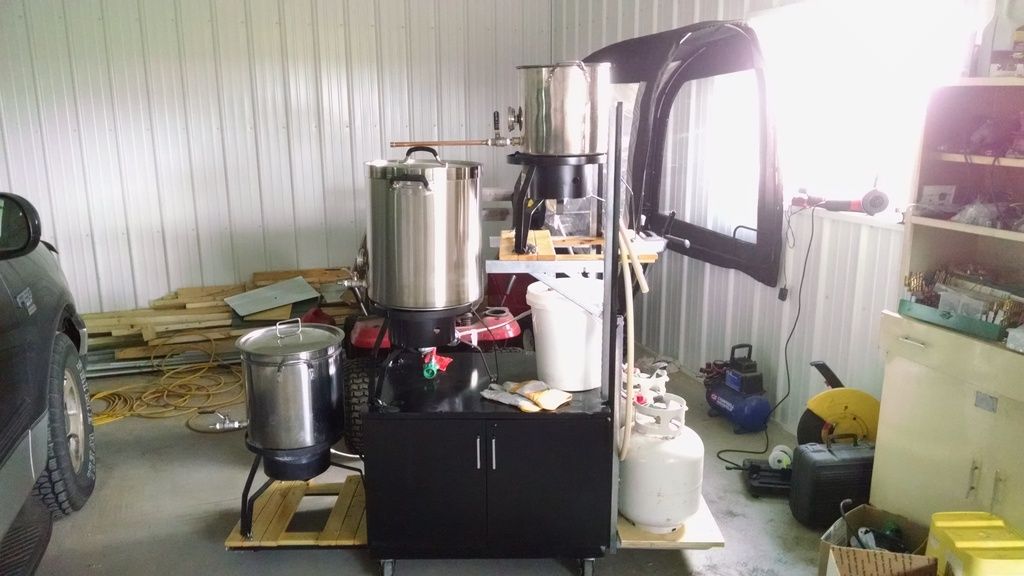MagicMatt
Brewmathemagician
Nice! You must be a project manager.
Lead Software Engineer. Though my PM sucks so yeah I mostly do her work for her.

Nice! You must be a project manager.
I have resisted going full all-grain because it seems to be a lot to do alone. Due to my schedule and that of my friends, we are not able to get together as often as we'd like to brew, so I usually end up just doing an extract batch after putting the kids to bed. I have an all-grain setup with pump and plate chiller, so in theory it should be easy. I am skeptical though, and don't want to get into a 7 hour ordeal before realizing I have made a poor choice.
For those of you who do all-grain alone, what are your tips and secrets?
I crush my grain as I heat the strike water, and I heat the hot liquor at the same time. My 10 gallon batches take about 6 hours, mostly due to the volume of water I heat.I always brew alone. I could not ever imagine having the 7 hour brew day that you fear in the OP. One hour mash, One hour to ninety minute boil, chill it. That's two and a half, add in time for cleaning and heating water makes it about 4 hours with only about 30 minutes being actively spent doing something. To save time... crush grains in advance, set up as much equipment as you can in advance as well. CLEAN AS YOU GO!!!! Super easy and doable to have a 3.5 to 4 hour all grain brew day solo.
I crush my grain as I heat the strike water, and I heat the hot liquor at the same time. My 10 gallon batches take about 6 hours, mostly due to the volume of water I heat.










I made a Gantt chart when I first started All Grain to help me visualize and streamline my process:
[...]Safety is the biggest issue brewing alone.



I have even done 15 gallon batches so I can use different yeasts and dry hops, it takes the same amount of time.Doing 10-gallon batches introduces an interesting side element to time efficiency.
I'm doing 5 gallons in about 5 hours. You're doing 10 gallons in about 6 hours. So by my figuring, your second 5-gallon batch only takes an hour.
Only to you.
Had a conversation w/ my son (who also brews and who helped me get interested in this) and he does mostly smaller batches. He lives in an apartment so it's a stove setup he uses.
I was lamenting the turn to MUCH colder weather here in Tundraland, and he suggested going to small batches brewed inside on the stove.
I actually thought seriously about that, though to me there isn't much in the way of time savings. I'd be able to heat water much faster on the stove, and bring the wort to boil much faster, probably shaving 20 minutes off the process. But in the end, I still need to mash for an hour, still need to boil for an hour, still need to crush the grain, etc. etc. etc.
One reason I shy away from small batches is the reduction in time spent isn't anywhere near proportional to the reduction in beer brewed.
Lately, I have been thinking about moving to either ten gallon batches or partigyle to maximize the time spent on mashing and sparging. Its seems like I could almost make two brews in the time it takes to make one 5 gallon batch now.That's just about right. But, other advantages to brewing 2.5g batches (for me anyway) are that all the gear goes in a few bins in the garage, and I brew more often, get more variety, and get better at it faster...
Very impressive. I trust it works as good as it looks
Lately, I have been thinking about moving to either ten gallon batches or partigyle to maximize the time spent on mashing and sparging. Its seems like I could almost make two brews in the time it takes to make one 5 gallon batch now.
[...]I want to move to 11 gallon batches (5.5g now), but not wanting to buy any pumps until I go all electric.
As it is, I have to lift my kettle after sparging to get it onto the burner. Don't think that's gonna work with 10g batches.
I occasionally do 10 gallon batches with no pumps by brewing a high gravity beer and then diluting it with water in the fermenters before pitching the yeast. I buy the grain and hops for a 10 gallon recipe but only use enough strike and sparge water to yield about 8 - 9 gallons into the brew kettle. When I'm done with the boil, half goes into one fermenter and half goes into another fermenter and I top both off to 5 gallons with tap water. I prefer session type beers (3.5 - 6% ABV), so it works well for me.
Pretty much everyone uses the March 809s/815s or the Chugger equivalents, regardless of heating method.
I wouldn't put off picking them up. They're future-proof, and given what you're looking at in the meantime, might keep you out of the hospital.
On the batch I did this weekend with a 14g pre-boil volume, that'd be ~140 pounds of ~160°F wort and kettle.
Moving that would be bad juju...
Cheers!
I know this isn't exactly on topic, but is anyone doing 10-11 gallons all gravity-fed (i.e. no pumps)? I want to move to 11 gallon batches (5.5g now), but not wanting to buy any pumps until I go all electric. As it is, I have to lift my kettle after sparging to get it onto the burner. Don't think that's gonna work with 10g batches.
Pretty much everyone uses the March 809s/815s or the Chugger equivalents, regardless of heating method.
I wouldn't put off picking them up. They're future-proof, and given what you're looking at in the meantime, might keep you out of the hospital.
I pretty much do only 10 gallon batches, and I don't have any pumps yet; but its definitely in my plans (as in very soon) to get one.
I only have 2 tiers, and rather than lift the brew kettle, I drain the mash into buckets about 4 gallons at a time and pour that into the kettle. I also ferment in Sankeys, so post boil, I use a bottling bucket to transfer the wort to the fermenter (cause lifting 11 gallons in a sankey into my chest freezer fermentation chamber alone isn't going to happen.


I know this isn't exactly on topic, but is anyone doing 10-11 gallons all gravity-fed (i.e. no pumps)? I want to move to 11 gallon batches (5.5g now), but not wanting to buy any pumps until I go all electric. As it is, I have to lift my kettle after sparging to get it onto the burner. Don't think that's gonna work with 10g batches.
I occasionally do 10 gallon batches with no pumps by brewing a high gravity beer and then diluting it with water in the fermenters before pitching the yeast. I buy the grain and hops for a 10 gallon recipe but only use enough strike and sparge water to yield about 8 - 9 gallons into the brew kettle. When I'm done with the boil, half goes into one fermenter and half goes into another fermenter and I top both off to 5 gallons with tap water. I prefer session type beers (3.5 - 6% ABV), so it works well for me.